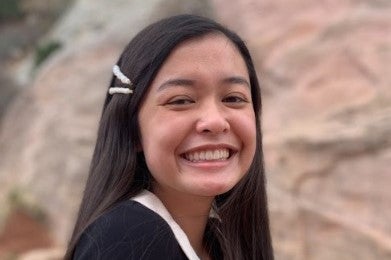Mikaela Salvador receives AGU Outstanding Student Presentation Award
Salvador investigated the diversity and symbiotic relationships of nitrogen-fixing microorganisms – which are involved with critical biogeochemical cycles – within marine sediments and deep-sea methane seeps.
Undergraduate Mikaela Salvador has been selected to receive an Outstanding Student Presentation Award (OSPA) from the American Geophysical Union (AGU).
The prestigious award is given to promote, recognize and reward undergraduate, Master’s and PhD students for quality research in the geophysical sciences. Typically, only the top 3 to 5 percent of student participants who present their research at the annual AGU Fall meeting are awarded an OSPA.
Salvador presented her research, “Assessing the Phylogenetic Diversity of nifH-containing Organisms at Deep-Sea Methane Seeps and Non-Seep Sediments,” at the 2020 fall meeting in December, which was on a virtual platform.
“I was actually pretty surprised when I received the email that I won,” said Salvador, a sophomore in Earth Systems on the Biosphere track at the School of Earth, Energy & Environmental Sciences (Stanford Earth). “My research mentor, Bennett Kapili, told me how rare they are to come by and that no one in my lab had received it, so I really had no expectations.”
Salvador became involved with the project as a participant in the 2020 cohort of Stanford Earth Summer Undergraduate Research Program (SESUR), a 10-week program that offers interdisciplinary research and community building, as well as mentor positions for graduate students and postdoctoral researchers at Stanford Earth. The opportunity to conduct research as an undergraduate despite the 2020 shelter-in-place order is a testament to the lab, run by assistant professor of Earth system science Anne Dekas, according to SESUR director Jennifer Saltzman. In addition to Dekas and Kapili, Salvador was mentored by graduate student Amanda Semler.
“My thanks really go to her mentors for stepping up and reimagining how Mikaela could contribute to their research,” Saltzman said. “Some SESUR projects were cancelled, but Anne and her team took their responsibility seriously and came up with this fabulous project.”
“I could not have won the Outstanding Student Presentation Award without my mentors’ constant feedback and guidance,” Salvador added.
Salvador explored the diversity and symbiotic relationships of nitrogen-fixing microorganisms within marine sediments and deep-sea methane seeps. Nitrogen-fixing microorganisms – which can convert nitrogen gas into a form usable by plants – are involved with critical biogeochemical cycles. Most notably, some of them also oxidize methane, a potent greenhouse gas, thereby preventing its release into the water column.
“Her work helps us further understand how the carbon and nitrogen cycles are linked in marine sediments – and her findings are helping me plan the last analyses for my dissertation,” said Kapili, a PhD student in Earth system science.
The research makes compelling predictions of which microbial groups are capable of eating nitrogen gas and suggests that symbiosis – an often-interdependent interaction between two different organisms living in close association – may be essential for deep-sea nitrogen conversion.
“Mikaela was able to answer fundamental questions about deep-sea microbial ecology from her home in Colorado using only publicly available data and an analysis pipeline recently developed by Bennett,” Dekas said. “I am so proud of this research team and the results they were able to generate, especially under such unusual circumstances.”
Because the AGU fall meeting was held online, Salvador was among the participants that produced a virtual presentation – and the process came with some surprises.
“Over fall quarter, I spent months perfecting the poster I had made for my SESUR symposium for the AGU conference in December, but discovered two weeks before the deadline we had to use AGU’s online templates,” Salvador said. “I basically had two weeks to reformat an entire poster that I had spent months on.”
Salvador’s project contributes to ongoing work in the Dekas Geomicrobiology Laboratory, which focuses on understanding the microbiology and biogeochemistry of the deep sea. The lab’s foundational research on microorganisms, which are critical to understanding the modern environment and history of the Earth, is becoming increasingly important in an era of climate change.
“We are excited to include these results in a publication currently in preparation and follow up with additional analyses,” Dekas said. “This was Mikaela’s first research experience, and she tells us it’s not going to be her last.”
Salvador’s virtual presentation may be viewed here.
